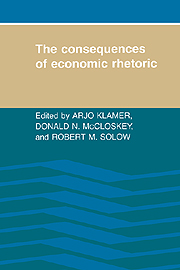Book contents
- Frontmatter
- Contents
- Preface
- The consequences of economic rhetoric
- PART I ECONOMIC RHETORIC: INTRODUCTION AND COMMENTS
- PART II ECONOMIC RHETORIC: FURTHER ARGUMENTS
- 5 Marxian theory and the rhetorics of economics
- 6 Economic rhetoric: The social and historical context
- 7 The ideas of economists
- 8 Should a scientist abstain from metaphor?
- PART III ECONOMIC RHETORIC AMONG ECONOMISTS
- PART IV ECONOMIC RHETORIC IN POLITICS AND JOURNALISM
- PART V ECONOMIC RHETORIC: ITS RHETORIC AND ITS CONSEQUENCES
- 1 Appendix: Other contributors and participants
- Index
8 - Should a scientist abstain from metaphor?
Published online by Cambridge University Press: 07 September 2010
- Frontmatter
- Contents
- Preface
- The consequences of economic rhetoric
- PART I ECONOMIC RHETORIC: INTRODUCTION AND COMMENTS
- PART II ECONOMIC RHETORIC: FURTHER ARGUMENTS
- 5 Marxian theory and the rhetorics of economics
- 6 Economic rhetoric: The social and historical context
- 7 The ideas of economists
- 8 Should a scientist abstain from metaphor?
- PART III ECONOMIC RHETORIC AMONG ECONOMISTS
- PART IV ECONOMIC RHETORIC IN POLITICS AND JOURNALISM
- PART V ECONOMIC RHETORIC: ITS RHETORIC AND ITS CONSEQUENCES
- 1 Appendix: Other contributors and participants
- Index
Summary
Introduction
Positivism is dead, we all agree. Gone is the rigid set of dichotomies purporting to define what can be meaningfully said and what is deprived of meaning, what is literal and what is expressive, figurative, or whatever. Abandoned, too, is the pretense of a unique, authoritative system of conditions defining scientific rationality once and for all. I could continue this necrology forever, since almost all of the tenets of the received view have been relinquished. We are left without a system, without a large and encompassing view of knowledge and cognition. Indeed, many of those who have given up positivism also doubt that these categories, knowledge and cognition, should prominently figure in an account of what we do when we engage in a scientific activity.
If scientific method is not the exhaustive list of procedures positivists pretended it to be, then – it is argued – it is just the set of practices adopted by given communities. Such practices are manufactured and relative, and science as a human activity should be considered from a whole series of perspectives, including the sociological, anthropological, and rhetorical ones. When one engages in a scientific practice, or for that matter in any other social practice, one enters into a complex web of power relations, has to learn the norms regulating research and the publication of results, has to master the tools of the trade, which include not only knowing how to do research but also, as McCloskey argues, knowing how to present one's findings in appropriate ways (McCloskey 1985).
- Type
- Chapter
- Information
- The Consequences of Economic Rhetoric , pp. 100 - 114Publisher: Cambridge University PressPrint publication year: 1989
- 8
- Cited by

